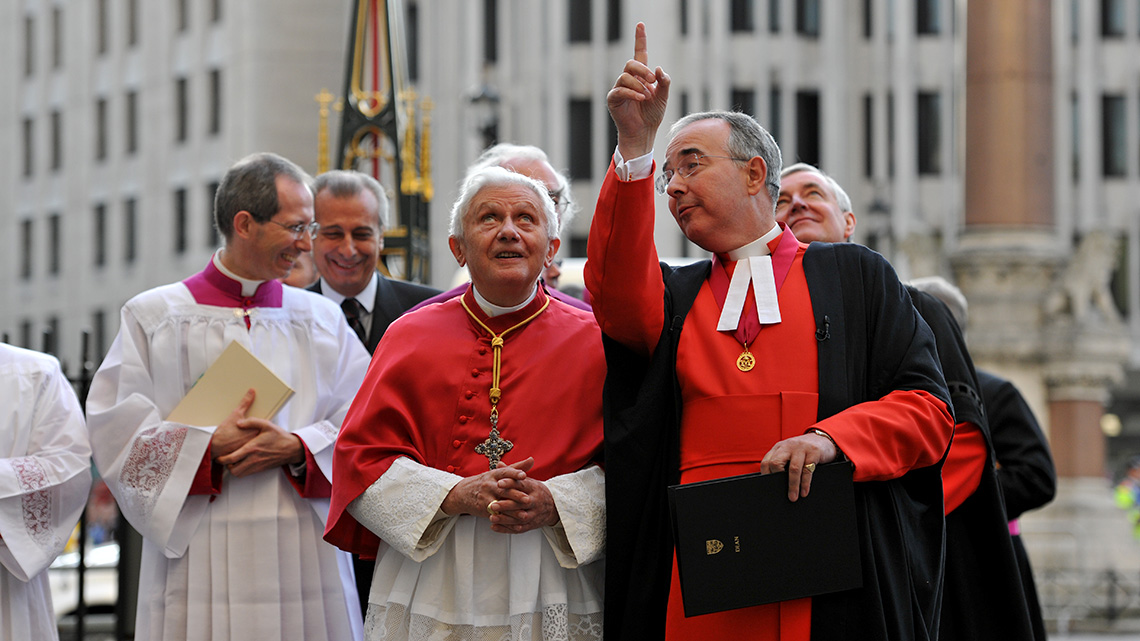
Christian Churches across the world express deep sorrow at the death of Pope Emeritus Benedict XVI and remember him as a fine theologian committed to ecumenical dialogue and a very humane person.
As thousands of people begin to flock to St. Peter’s Basilica in the Vatican to pay their final respects to Benedict XVI, tributes to the late Pope Emeritus continue to pour in from across the world, including other Christian Churches, Heads of state and government, and also from faith leaders of other religions.
Following the announcement of his passing away on 31 December, the acting general secretary of the World Council of Churches (WCC) Reverend Ioan Sauca, expressed the “deepest condolences” of all its member Churches, highlighting his significant contribution to ecumenical dialogue.
Noting that he was the first pope to have come from a country, Germany, with a roughly equal balance between Protestants and Catholics, and one that had been at the very centre of the 16th century Reformation, Rev. Sauca also remarked that Benedict XVI was the first Catholic Pontiff to have belonged to a committee of the WCC, as one of the Catholic members of its ‘Faith and Order Commission’.
“He demonstrated courage as much in his leadership, his writings, and his pronouncements,” said Sauca, remarking that “In the one ecumenical movement he constantly affirmed as irreversible the deep involvement of the Roman Catholic Church in ecumenism, especially in responding to the challenging issues for the church in the world.”
These sentiments of sadness are echoed by WCC Central Committee moderator Bishop Dr Heinrich Bedford-Strohm, who emphasised:
“I share my heartfelt condolences about the death of Pope Emeritus Benedict XVI with Pope Francis and his whole Church. The German Lutheran bishop said he still remembers distinctly the late Emeritus’ words spoke at a service on his 85th birthday on 16 April 2012 in the Vatican Pauline Chapel, which he attended with a Bavarian delegation. On that occasion Benedict XVI stated: ‘I am now facing the last chapter of my life and I do not know what awaits me. I know, however, that the light of God exists, that he is Risen, that his light is stronger than any darkness, that the goodness of God is stronger than any evil in this world.’
“I am sure that he now experiences the truth of these words spoken then,” Bishop Bedford-Strohm commented.
For her part, the president of the Council of the Evangelical Church of Germany (EKD) Annette Kurschus has highlighted the Pope Emeritus’ theological acumen, as well as his contribution to ecumenic dialogue:
“Joseph Ratzinger has provided theological contributions with great insight and intellectual synthesis that have impressed Christianity in general and the public far beyond the Catholic Church,” the Lutheran theologian said in a reflection published on the EKD’s website. “At the same time, they have given guidance to many people.”
Kurschus recalls in particular Benedict XVI’s words during his Apostolic Journey to Germany in 2011 in which he stressed that “The most important thing for ecumenism is not to lose sight of the great things in common that make us Christians in the first place. This is a central ecumenical task in which we must help each other: to believe more deeply and more vividly.” The EKD, she says, shares this concern and “we are still grateful for this emphasis to this day.” Kurschus further remarked that his decision to resign in 2013 made him “deeply human”.
Benedict XVI’s commitment to Christian unity and courage in resigning have been also highlighted by the Ecumenical Patriarch of Constantinople, Bartholomew I who expressed “respect, love and gratitude” for the late Pope.
During a Divine Liturgy celebrated on Sunday at the Phanar for the first day of the year, the Head of the Greek Orthodox Church, recalled the Common Declaration they signed on November 30 in Istanbul, during his Apostolic Journey to Turkey, marking a further historic step forward in Catholic-Orthodox relations. Noting that they worked together all along his pontificate, the Patriarch again highlighted was a distinguished theologian, whose deep knowledge of Orthodox theology was very much appreciated in the Orthodox world.
Bartholomew further highlithed his “fortitude and courage” to resign just eight years after his election as Bishop of Rome. “He could go on because he was in good health, but they decided he had to lay down the mandate, and that happened about five hundred, six hundred years after the last pope of Rome resigned. May his memory be everlasting,” the head of the Greek Orthodox concluded.
The Ecumenical Patriarchate of Constantinople will be represented at his funeral Mass on January 5 by the Metropolitan Emmanuel of Chalkidon and Metropolitan Polykarpos of Italy.
The Orthodox Patriarch of Moscow, Kirill, also sent his condolences, remarking that under his pontificate relations between the Russian Orthodox Church and the Roman Catholic Church made significant progress.
In his message the head of the Russian Orthodox Church highlighted Benedict XVI’s contribution in bearing witness to Christ in a secularized world and in defending traditional moral values.
“Having had the opportunity to personally meet the late Pope several times, I was able to testify his deep love for Eastern Christianity and, in particular, his sincere respect for the tradition of Russian Orthodoxy,” he said.
Other Orthodox Church leaders also shared their condolences for the Pope Emeritus’ death. Among them Pope Tawadros II, head of of the Orthodox Coptic Church in Egypt, who hailed Benedict XVI as “the best successor to the best predecessor” Pope St. John Paul II, who spent his entire life in “the service of his Roman Catholic Church” and Romanian Patriarch Daniel, who described him as a “venerable and well-known contemporary personality.”
Source: Vatican News